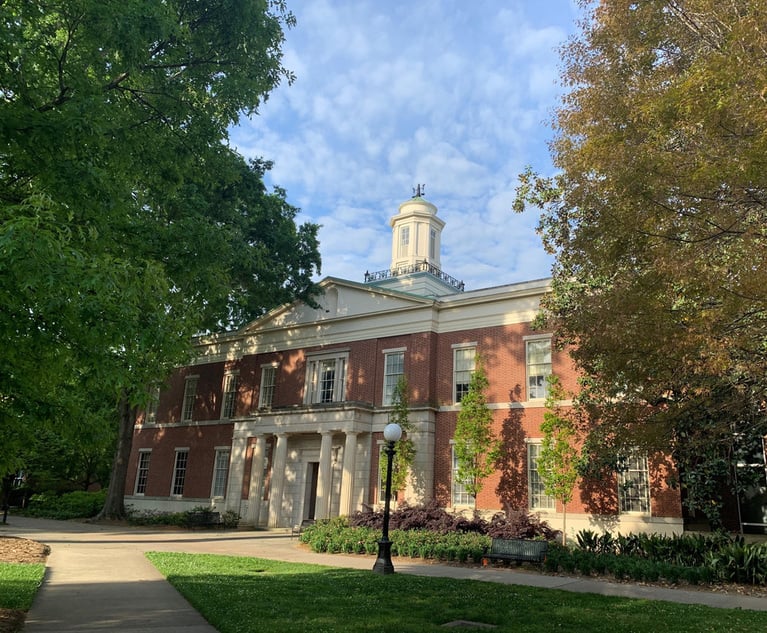Kemp Slaps Back at Judge's Absentee Ballot TRO
The move comes as the state prepares to appeal a federal judge's order barring election officials across Georgia from rejecting absentee ballots because of alleged signature discrepancies.
October 25, 2018 at 06:12 PM
4 minute read
The original version of this story was published on Daily Report
 Georgia Secretary of State Brian Kemp (Photo: John Disney/ ALM)
Georgia Secretary of State Brian Kemp (Photo: John Disney/ ALM)
Secretary of State Brian Kemp on Thursday asked a federal judge for an emergency stay of her temporary restraining order barring election officials across Georgia from rejecting absentee ballots because of alleged signature discrepancies.
The motion, filed by Senior Assistant Attorney General Christina Correia with the office of state Attorney General Chris Carr, sought the stay until she can appeal U.S. District Judge Leigh Martin May's orders granting and implementing the TRO.
Correia sought the stay to allow a review by the U.S. Court of Appeals for the Eleventh Circuit in Atlanta, contending an appeal “will ensure at least a measure of careful deliberation before upending the state's election processes in the middle of a general election.”
In announcing an intended appeal, Correia said Martin's restraining order added “brand new, untested processes ad hoc to long-established election procedures at the eleventh hour.” Correia also contended it “will introduce uncertainty and confusion under extreme time pressure at best” and “risks undermining the integrity of the state's election process.”
Correia also argued that receiving an absentee ballot and being able to vote by absentee ballot “together amount at most to a privilege and a convenience” rather than a fundamental right to vote.
The policies and procedures resulting in absentee ballot rejections not only don't burden citizens' fundamental right to vote, but “the entire mail ballot scheme expands the franchise by providing voters with an additional and convenient option for voting,” the motion said. Voters whose ballots are rejected—either because of signatures that don't match voter registrations or absentee ballot applications—can still vote in person or apply a second time for a ballot, Correia contended.
Correia also argued that securing statewide compliance with May's order would impose “significant administrative burdens,” including the manner in which some counties track absentee ballot rejections and the creation of what the state said were “new rights of appeal” by voters whose ballots were rejected.
The ACLU lawyers said they were disappointed that Kemp decided to appeal.
In granting the TRO in lawsuits brought by the ACLU on behalf of the Georgia Muslim Voter Project and Asian Americans Advancing Justice-Atlanta and by a group of Georgia voters and political candidates, May directed that all absentee ballots rejected because of alleged signature discrepancies be converted to provisional ballots.
May also directed that voters be sent pre-rejection notices by mail and electronically and be given an opportunity to resolve any alleged discrepancy and to confirm their identity. May said that voters who are traveling or unable to appear in person and whose ballot signatures were questioned may send an attorney to present proper identification.
She also said absentee voters have the right to appeal a ballot rejection. Appeals will not delay certification of any election unless votes under appeal would change an election's outcome.
In a lengthy Oct. 24 order granting the TRO, Martin rejected complaints that salvaging rejected absentee ballots would be “unduly burdensome.”
“The Court does not understand how assuring that all eligible voters are permitted to vote undermines integrity of the election process,” May said. “To the contrary, it strengthens it.”
Correia also raised the specter of voter fraud, contending that allowing an attorney to confirm a voter's identity “merely by having the voter's identification plainly introduces a risk of fraud—particularly absent any kind of oath or affidavit requirement for the 'attorney' presenting the voter's identification.”
And, she argued, “There is no system or reporting requirement in place for determining whether the number of ballots subject to unresolved appeals across the state is high enough to potentially change the outcome of the election.”
Read the filing below:
This content has been archived. It is available through our partners, LexisNexis® and Bloomberg Law.
To view this content, please continue to their sites.
Not a Lexis Subscriber?
Subscribe Now
Not a Bloomberg Law Subscriber?
Subscribe Now
NOT FOR REPRINT
© 2025 ALM Global, LLC, All Rights Reserved. Request academic re-use from www.copyright.com. All other uses, submit a request to [email protected]. For more information visit Asset & Logo Licensing.
You Might Like
View All
Librarian's Termination Violated First Amendment Protections, Lawsuit Claims
3 minute read
SEC Sued for Failing to Reveal Records Involving Simpson Thacher Attorney
3 minute read
PayPal Faces New Round of Claims; This Time Alleging Its 'Honey' Browser Extension Cheated Consumers

Trending Stories
- 1Legal Community Mourns the Loss of Trailblazing Judge Dorothy Chin Brandt
- 2Delaware Supreme Court, Reversing Chancery, Lowers Review Standard for TripAdvisor Move to Nevada
- 3Haynes and Boone Expands in New York With 7-Lawyer Seward & Kissel Fund Finance, Securitization Team
- 4Upstart Insurer That's Wowing Industry Hires AIG Legal Exec to Help Guide Global Expansion
- 5Connecticut Lawyers in Spotlight for Repping FBI Agents
Who Got The Work
J. Brugh Lower of Gibbons has entered an appearance for industrial equipment supplier Devco Corporation in a pending trademark infringement lawsuit. The suit, accusing the defendant of selling knock-off Graco products, was filed Dec. 18 in New Jersey District Court by Rivkin Radler on behalf of Graco Inc. and Graco Minnesota. The case, assigned to U.S. District Judge Zahid N. Quraishi, is 3:24-cv-11294, Graco Inc. et al v. Devco Corporation.
Who Got The Work
Rebecca Maller-Stein and Kent A. Yalowitz of Arnold & Porter Kaye Scholer have entered their appearances for Hanaco Venture Capital and its executives, Lior Prosor and David Frankel, in a pending securities lawsuit. The action, filed on Dec. 24 in New York Southern District Court by Zell, Aron & Co. on behalf of Goldeneye Advisors, accuses the defendants of negligently and fraudulently managing the plaintiff's $1 million investment. The case, assigned to U.S. District Judge Vernon S. Broderick, is 1:24-cv-09918, Goldeneye Advisors, LLC v. Hanaco Venture Capital, Ltd. et al.
Who Got The Work
Attorneys from A&O Shearman has stepped in as defense counsel for Toronto-Dominion Bank and other defendants in a pending securities class action. The suit, filed Dec. 11 in New York Southern District Court by Bleichmar Fonti & Auld, accuses the defendants of concealing the bank's 'pervasive' deficiencies in regards to its compliance with the Bank Secrecy Act and the quality of its anti-money laundering controls. The case, assigned to U.S. District Judge Arun Subramanian, is 1:24-cv-09445, Gonzalez v. The Toronto-Dominion Bank et al.
Who Got The Work
Crown Castle International, a Pennsylvania company providing shared communications infrastructure, has turned to Luke D. Wolf of Gordon Rees Scully Mansukhani to fend off a pending breach-of-contract lawsuit. The court action, filed Nov. 25 in Michigan Eastern District Court by Hooper Hathaway PC on behalf of The Town Residences LLC, accuses Crown Castle of failing to transfer approximately $30,000 in utility payments from T-Mobile in breach of a roof-top lease and assignment agreement. The case, assigned to U.S. District Judge Susan K. Declercq, is 2:24-cv-13131, The Town Residences LLC v. T-Mobile US, Inc. et al.
Who Got The Work
Wilfred P. Coronato and Daniel M. Schwartz of McCarter & English have stepped in as defense counsel to Electrolux Home Products Inc. in a pending product liability lawsuit. The court action, filed Nov. 26 in New York Eastern District Court by Poulos Lopiccolo PC and Nagel Rice LLP on behalf of David Stern, alleges that the defendant's refrigerators’ drawers and shelving repeatedly break and fall apart within months after purchase. The case, assigned to U.S. District Judge Joan M. Azrack, is 2:24-cv-08204, Stern v. Electrolux Home Products, Inc.
Featured Firms
Law Offices of Gary Martin Hays & Associates, P.C.
(470) 294-1674
Law Offices of Mark E. Salomone
(857) 444-6468
Smith & Hassler
(713) 739-1250








